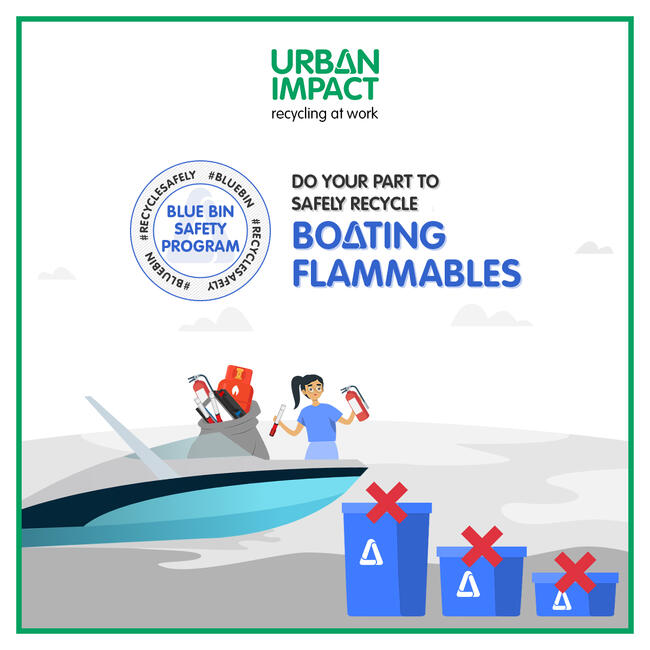- Log in to post comments

From motorboats to sail boats, being on the water especially in the summer, can be a fun-filled experience. In part three of our Blue Bin Summer Safety Recycling Program, we explore best practices for properly disposing of common flammable boating items, such as gas tanks, fire extinguishers and flares.
Boating Gas Tanks
The improper use and storage of gasoline is a major cause of boat fires. Petroleum is highly volatility and can potentially catch on fire . Don't put gas tanks or any pressurized container in your blue bin or garbage. They can cause explosions when compacted in collection trucks or a recycling plant.
To safely and properly dispose of the old gas, gas tank, including hoses, take these items to your local hazardous waste disposal center. Find a RCBC’s Recyclepedia or Product Care Canada drop-of near you or contact the RCBC Recycling Hotline.
Boating Gas Tips:
- Never fill your boat’s gas tank beyond 90% full. This leaves room for gas to expand and avoids the potential for overflow.
- Ensure that all air vents and valves to the gas tank are open. After you're done fueling, tightly replace the gas cap.
- Proper maintenance of boat fuel tanks ensures safe and efficient operation.
- When storing your boat for the winter, make sure the tank is completely empty. Any fuel that remains will likely separate. Once separated, if fuel gets into the carburetor, it will likely ruin the engine.
Boating Batteries
Marine batteries fall in the lead acid category and are considered hazardous because of the metals and other toxic or corrosive materials they contain. Even when a marine battery is end of life, they should never go in a Blue Bin or the garbage.
Old batteries can leak and are still capable of producing electricity. If a battery leaks in a landfill, it can contaminate groundwater. Because old batteries are still capable of producing electricity, that can create a spark or fire, causing safety incidents at processing facilities.
To recycle, place batteries into a specific Battery Collection container. if you have more than one battery, put them in separate containers. The Canadian Battery Association has developed a province-wide lead-acid battery recycling program http://recyclemybattery.ca/
Marine batteries are also accepted, for free, at some participating retailers, as well as, at private scrap metal or battery recycling companies. Call the RCBC Hotline for more information at 1-800-667-4321.
Fire Extinguishers For Boating
Although boats are usually surrounded by water, that does not make them immune to fire. Portable marine fire extinguishers are indispensable for boats and are required safety equipment for most boats. When properly used, a portable fire extinguisher can put out or control a small boat fire.
Fire extinguishers have a limited lifespan, typically ranging from 5 to 15 years. When fire extinguishers expire or become non-functional, it’s important to dispose of them properly.
Tips for when to replace a fire extinguisher
- Slow loss of pressure despite not being used for a long time
- Cracked or clogged nozzle
- Wobbly or broken handle
- Damaged outer shell
- Failed hydrostatic test
Flammable and hazardous, fire extinguishers can explode. Don’t put fire extinguishers in the Blue Bin or the garbage. If crushed in a recycling truck, they can explore, putting workers and the environment at risk.
If partially used or past expiry, fire extinguishers can be returned, serviced and recharged at a local fire extinguisher supply and servicing company. Before recycling empty fire extinguishers be should the are entirely emptied, and the valve are removed.
Boating Signal Flares
Signal flares, also known as pyrotechnic distress signals, are devices boaters can use to call for help in emergency situations. Boats must always have a certain number of valid distress flares on board when over one nautical mile away from shore.
As flares are flammable they create a fire and explosion risk when processed in recycling facilities and trucks. Disposing of expired flares improperly can create dangerous conditions. Don’t put flares in the #bluebin or the garbage. Here are few tips on how to properly dispose of flares:
The only safe way to properly dispose of flares is through a licensed explosives disposal company. Expired flares can be dropped off at the following locations:
- Inlet Marine: 4-850 Barnet Hwy, Port Moody, BC V3H 1V6
- Steveston Marine and Hardware: 19700 Langley Bypass #201, Langley, BC V3A 7B1
- 8331 River Rd Richmond BC V6X 1Y1
- 1667 W 5th Ave, Vancouver, BC V6J 1N5
- For more information in your area, please call the Recycling Hotline at 604-732-9253 or 1-800-667-4321, Monday to Friday, 9am to 4pm.
Signal Flare Tips
- Distress flares should be stored vertically in a cool, dry place, ideally a watertight container.
- Keep them away from heat sources, flammable liquids and gas.
- Keep them close at hand so that they are easily accessible in the event of an emergency.
Be sure you have the necessary equipment for a fun and safe boating adventures, and do your part to properly and safely recycle boating flammables!
